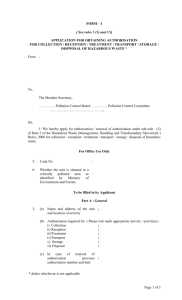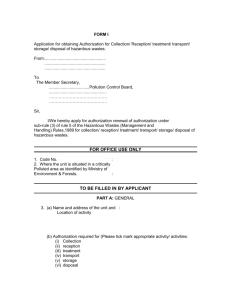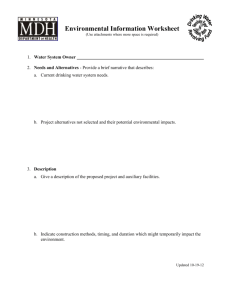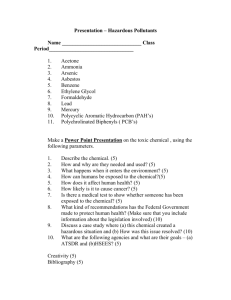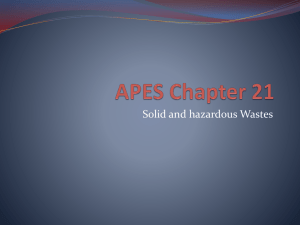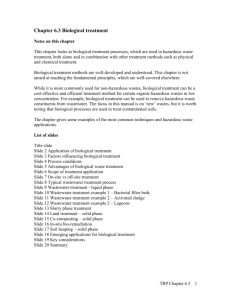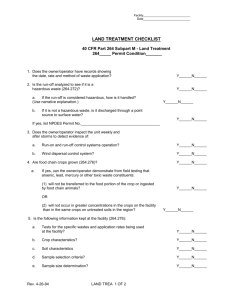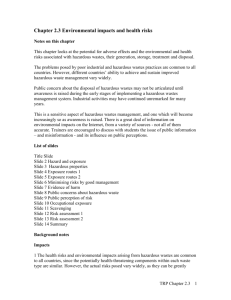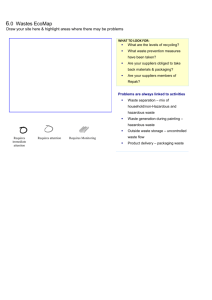China - Basel Convention
advertisement
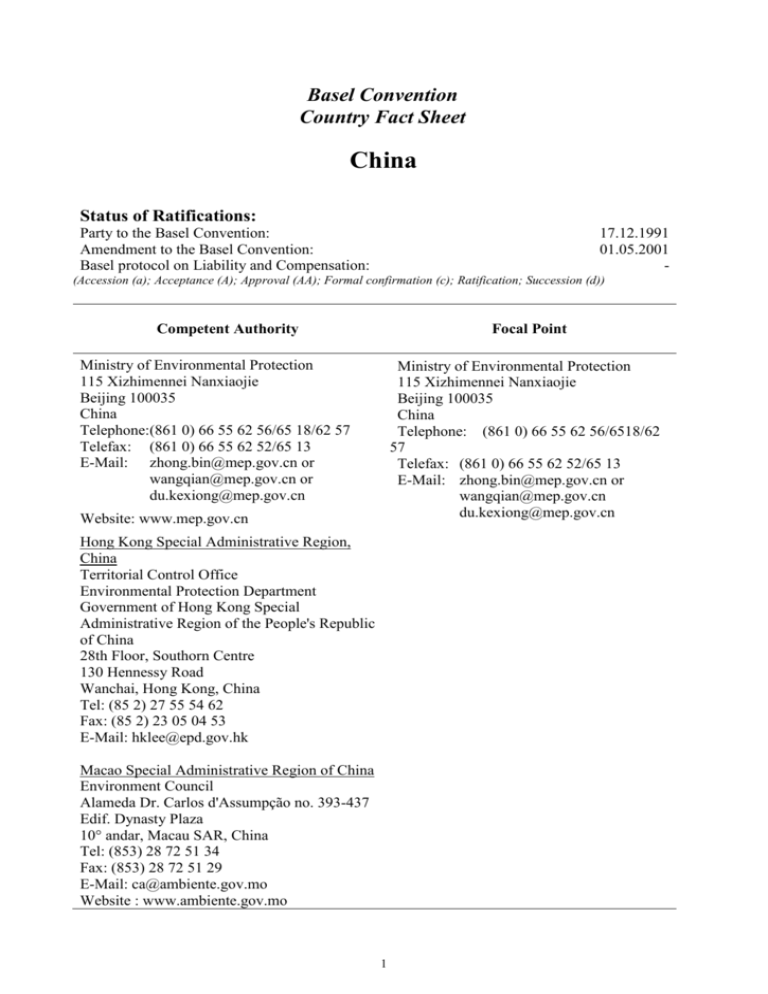
Basel Convention Country Fact Sheet 2002 2006 China Status of Ratifications: Party to the Basel Convention: Amendment to the Basel Convention: Basel protocol on Liability and Compensation: 17.12.1991 01.05.2001 - (Accession (a); Acceptance (A); Approval (AA); Formal confirmation (c); Ratification; Succession (d)) Competent Authority Focal Point Ministry of Environmental Protection 115 Xizhimennei Nanxiaojie Beijing 100035 China Telephone:(861 0) 66 55 62 56/65 18/62 57 Telefax: (861 0) 66 55 62 52/65 13 E-Mail: zhong.bin@mep.gov.cn or wangqian@mep.gov.cn or du.kexiong@mep.gov.cn Ministry of Environmental Protection 115 Xizhimennei Nanxiaojie Beijing 100035 China Telephone: (861 0) 66 55 62 56/6518/62 57 Telefax: (861 0) 66 55 62 52/65 13 E-Mail: zhong.bin@mep.gov.cn or wangqian@mep.gov.cn du.kexiong@mep.gov.cn Website: www.mep.gov.cn Hong Kong Special Administrative Region, China Territorial Control Office Environmental Protection Department Government of Hong Kong Special Administrative Region of the People's Republic of China 28th Floor, Southorn Centre 130 Hennessy Road Wanchai, Hong Kong, China Tel: (85 2) 27 55 54 62 Fax: (85 2) 23 05 04 53 E-Mail: hklee@epd.gov.hk Macao Special Administrative Region of China Environment Council Alameda Dr. Carlos d'Assumpção no. 393-437 Edif. Dynasty Plaza 10° andar, Macau SAR, China Tel: (853) 28 72 51 34 Fax: (853) 28 72 51 29 E-Mail: ca@ambiente.gov.mo Website : www.ambiente.gov.mo 1 National Definition National definition of waste used for the purpose of transboundary movements of waste exists in China. China "Solid waste" refers to any solid, semisolid, or contained gaseous substance or material resulting from production, daily life and other activities, which lose its original utilization value, or which does not lose utilization value but is discarded, and substance or material regulated as solid waste by laws and regulations. National definition of hazardous waste used for the purpose of transboundary movements of waste exists in China. China "Hazardous wastes" means solid wastes included in the national catalogue of hazardous waste or solid wastes which, according to the identification standards of hazardous wastes, are determined as having the hazardous property. Hong Kong Special Administrative Region, China: The list of hazardous wastes for the purpose of control on waste import and export in Hong Kong Special Administrative Region (HKSAR) is specified in the Seventh Schedule (Annex 1) of the Waste Disposal Ordinance (WDO), the Laws of Hong Kong Chapter 354. Under the WDO, contaminated wastes are also controlled as hazardous wastes. For the purpose of control on import and export of wastes under the WDO, a waste is "contaminated" if it is contaminated by a substance to an extent which - Significantly increases the risk of human health, property or the environment associated with the waste; or - Prevents the reprocessing, recycling, recovery or re-use of the waste in an environmentally sound manner. China regulates/controls additional wastes as hazardous that are not included in Art. 1 (1)a of the Basel Convention and would be controlled for the purpose of transboundary movements pursuant to Art. 1 (1)b. China Nickel compound waste (code: HW46; source of the waste: wastes of nickel compound; reactionary residue and unqualified products from the production; overdue nickel catalysts; nickel residue and tank liquid from the electroplating process; waste nickel compounds from analysis, chemical examination and testing). Barium compound waste (code: HW47; source of the waste: wastes of barium compounds excluding barium sulfate; reactionary residue and unqualified products from the production of barium compound; salt bath residue from the heat treatment process; wasted barium compound from analysis, chemical examination and testing). China requires special consideration for the following waste(s) when subjected to transboundary movement: 2 In China, import of solid wastes that cannot be used as raw materials is prohibited. Up to now, wastes listed in the "Catalogue of AutomaticLicensing Import Solid Wastes that Can Be Used as Raw Materials in China" and "Catalogue of Restricted Import Solid Wastes that Can Be Used as Raw Materials in China" are permitted to be imported (Annex2). Restrictions on Transboundary Movement Amendment to the Basel Convention The amendment to the Basel Convention (Decision III/1) has been ratified China. The amendment has been approved by the 12th Meeting of the Standing Committee of the Ninth National People’s Congress on October 31, 1999. Restrictions on export for final disposal China restricts the export of hazardous wastes and other wastes for final disposal. China: The relevant legislation complies with the Basel Convention and Measures for Administration of Hazardous Waste Export Approval (No. 47 ORDER of SEPA). China The export for final disposal is allowed when there are no adequate disposal facilities in China capable of disposing the waste in an environmental sound manner. While we don’t have such restrictions on the export for recovery. The export of hazardous waste for disposal for which there are no adequate disposal facilities in China must comply with the requirements of the Basel Convention and Measures for Administration of Hazardous Waste Export Approval (No. 47 ORDER of SEPA). The transboundary movement can only take place upon prior written notification from the competent authorities of the states of export, to the competent authorities of the states of import and transit, and upon consent from these authorities. Furthermore, each shipment of hazardous waste should be accompanied by a movement document from the point at which the movement begins to the point of disposal. Hong Kong Special Administrative Region, China In addition to the Basel Convention requirements, the export of any waste for a purpose other than re-use, recovery, reprocessing or recycling (e.g. for final disposal including landfilling and incineration) of the waste is subject to control by the same procedure as that of the control of export of hazardous waste. Macao Special Administrative Region, China The export of waste for the purpose of final disposal will be subject to the controls according to the Basel Convention requirements. 3 Restrictions on export for recovery China restricts the export of hazardous wastes and other wastes for recovery. China: The relevant legislation complies with the Basel Convention and Measures for Administration of Hazardous Waste Export Approval (No. 47 ORDER of SEPA). China The export of hazardous waste for recovery must comply with the requirements of the Basel Convention and Measures for Administration of Hazardous Waste Export Approval(No. 47 ORDER of SEPA). The transboundary movement can only take place upon prior written notification from the competent authorities of the states of export, to the competent authorities of the states of import and transit, and upon consent from these authorities. Furthermore, each shipment of hazardous waste should be accompanied by a movement document from the point at which the movement begins to the point of recovery. Hong Kong Special Administrative Region, China In addition to the Basel Convention requirements, the export of any waste for a purpose other than re-use, recovery, reprocessing or recycling (e.g. for final disposal including landfilling and incineration) of the waste is subject to control by the same procedure as that of the control of export of hazardous waste. Macao Special Administrative Region, China The export of waste for the purpose of recovery will be subject to the controls according to the Basel Convention requirements. Restrictions on import for final disposal China restricts the import of hazardous wastes and other wastes for final disposal. China Decision on Several issues on Environmental Protection (State Council, No 31, 1996) prohibits the importation of hazardous waste and Municipal Solid Waste from abroad. Law of the People’s Republic of China on Prevention of Environmental Pollution Caused by Solid Waste, effective on April 1st, 2005; the Interim Regulation on the Administration of Environmental Protection in the Import of Waste Materials, entry into force on April 1st, 1996, which is under amendment; and the Environmental Protection Control Standards for Imported Waste Material, entry into force in 2006. Law of the People’s Republic of China on Prevention of Environmental Pollution Caused by Solid Waste: - Article 24: It is forbidden to dump, store or dispose of foreign solid wastes within the territory of the People’s Republic of China. - Article 25: The state forbids the import of solid wastes which can not 4 be used as raw materials or can not be used in an environmentally sound manner. And as to solid wastes which can be used as raw materials, they are divided into two categories. One is called automatic-licensing solid wastes that can be used as raw materials; the other is called restricted solid wastes that can be used as raw materials. Hong Kong Special Administrative Region, China With effect from 28 December 1998, import of hazardous wastes from states which are OECD members, European Community (EC) and Liechtenstein into HKSAR or through HKSAR to other states has been prohibited. The Waste Disposal Ordinance was amended in 2006 on this control and has been in effect since 7 April 2006. Hong Kong Special Administrative Region, China In addition to the Basel Convention requirements, the import of any waste for a purpose other than re-use, recovery, reprocessing or recycling (e.g. for final disposal including landfilling and incineration) of the waste is also subject to control by the same procedure as that of the control of import of hazardous waste. Macao Special Administrative Region, China The import of waste for the purpose of final disposal will be subject to the controls according to the Basel Convention requirements. Restrictions on import for recovery China restricts the import of hazardous wastes and other wastes for recovery. China Decision on Several issues on Environmental Protection (State Council, No 31, 1996) prohibits the import of hazardous waste and Municipal Solid Waste from abroad. Law of the People’s Republic of China on Prevention of Environmental Pollution Caused by Solid Waste, effective on April 1st, 2005; the Interim Regulation on the Administration of Environmental Protection in the Import of Waste Materials, entry into force on April 1st, 1996, which is under amendment; and the Environmental Protection Control Standards for Imported Waste Material, entry into force in 2006. According to Law of the People’s Republic of China on Prevention of Environmental Pollution Caused by Solid Waste, effective on April 1st, 2005, import of solid waste which can not be used as a raw material or can not be used in an environmentally sound manner is prohibited. Up to now, wastes listed in the " Catalogue of Automatic-Licensing Import Solid Wastes that Can Be Used as Raw Materials in China" and the " Catalogue of Restricted Import Solid Wastes that Can Be Used as Raw Materials in China" are permitted to be imported(Annex-2). Solid wastes which are not included in either of the above two Catalogues are forbidden to be imported. 5 Announcement 11, 2008, promulgated by State Environmental Protection Administration, Ministry of Commerce of the People’s Republic of China, National Development and Reform Commission, General Administration of Customs, General Administration of Quality Supervision, Inspection and Quarantine of the People’s Republic of China on January 29, 2008 (Annex-2). In Announcement 11, 2008, “Catalogue of Solid Waste Forbidden to Import in China”, “Catalogue of Restricted Import Solid Wastes that Can Be Used as Raw Materials in China”, and “Catalogue of AutomaticLicensing Import Solid Wastes that Can Be Used as Raw Materials in China” were promulgated. In Announcement 11, 2008, it was stipulated that those belong to any one of the following actions shall be managed in accordance with Forbidden Import Solid Wastes in China: (1) The goods prohibited to be imported in China have lost the original value in use, or not lost the value in use but been discarded or abandoned, or been considered as solid wastes for other reasons. (2) Those have been recognized as hazardous wastes and other wastes (Waste collected from household) in accordance with “Basel Convention on the Control of Transboundary Movements of Hazardous Wastes and Their Disposal”, as well as those have been listed in National Catalogue of Hazardous Waste or been considered as hazardous wastes under Identification Standard for Hazardous Wastes. Hong Kong Special Administrative Region, China With effect from 28 December 1998, import of hazardous wastes from states which are OECD members, European Community (EC) and Liechtenstein into HKSAR or through HKSAR to other states has been prohibited. The Waste Disposal Ordinance was amended in 2006 on this control and has been in effect since 7 April 2006. Hong Kong Special Administrative Region, China In addition to the Basel Convention requirements, the import of any waste for a purpose other than re-use, recovery, reprocessing or recycling (e.g. for final disposal including landfilling and incineration) of the waste is subject to control by the same procedure on control of import of hazardous waste. Macao Special Administrative Region, China The import of waste for the purpose of recovery will be subject to the controls according to the Basel Convention requirements. Restrictions on transit China restricts the transit of hazardous wastes and other wastes. China According to Solid Waste Law and the Ocean Environmental Protection Law, it is forbidden to transit of hazardous waste via the territory of the People's Republic of China, including via China’s inner water and 6 territorial waters. Transit of hazardous waste via other oceanic area under the jurisdiction of China shall get the written consent from MEP in advance. Hong Kong Special Administrative Region, China With effect from 28 December 1998, import of hazardous wastes from states which are OECD members, European Community (EC) and Liechtenstein into Hong Kong or through Hong Kong to other states has been prohibited. The Waste Disposal Ordinance was amended in 2006 on this control and has been in effect since 7 April 2006. Macao Special Administrative Region, China The transit of waste will be subject to the controls according to the Basel Convention requirements. Reduction and/or Elimination of Hazardous Waste Generation National strategies/policies China The State encourages and supports cleaner production and minimization of the generation of solid wastes. In recent years, MEP has made great efforts to promote cleaner production, including policy and regulation making, technical training, advanced experience spreading and etc. Law of the People’s Republic of China on Prevention of Environmental Pollution Caused by Solid Waste, effective on April 1st, 2005, stipulates: The principle of prevention of environmental pollution caused by solid waste in China includes reduction of the generation and harm of solid waste, recycling and disposal of solid waste in environmentally sound manner. The state takes measures to promote cleaner production and circular economy. The state manages to promote research on techniques and facility reducing generation and harm of industrial solid waste, publicizing the catalog of unadvanced techniques and facilities need to be eliminated. Industrial corporation should choose and use materials, energy and other resources properly, reduce generation and harm of industrial solid waste. MEP has done lots of work to facilitate establishment of hazardous waste market and enhance domestic hazardous waste disposal capacity. For this purpose, we are carrying out a program of hazardous waste and medical waste disposal facility constructing throughout China. Hong Kong Special Administrative Region, China A Waste Reduction Framework Plan was launched in November 1998 to minimize the amount of waste produced that requires disposal and to promote recycling of different types of wastes. One initiative being undertaken is to study waste management tools and technologies that can reduce the amount of waste requiring final disposal. The Government has reserved land to set up a Recovery Park and encourage development of waste minimization and recycling technologies. 7 A Policy Framework for the Management of Municipal Solid Waste for 2005-2014 has been published in 2005 to advocate waste avoidance and minimization in Hong Kong and outline the HKSAR Government's three-tier approach to achieve a sustainable waste-management strategy: waste avoidance and minimization; reuse, recovery and recycling; and bulk reduction and disposal of unavoidable waste. Waste charging, producer-responsibility schemes and landfill-disposal bans underpin the framework, with sustained public education and partnership, and legislative backing for support. It also proposes to develop state-of-theart Integrated Waste Management Facilities with incineration as the core technology for final waste treatment. A territory-wide waste recovery programme was introduced in January 2005 to facilitate separation of different types of wastes at sources. A 20-hectare EcoPark is being developed by the HKSAR Government to provide long term land for the recycling industry, which would facilitate local recycling of recovered wastes. In parallel, the feasibility of introducing a producer responsibility scheme on handling of obsolete electrical and electronic equipment is being studied. HKSAR Government provides funding support to the development of recycling technologies through the Environment and Conservation Fund and the Innovation and Technology Fund. In addition, Hong Kong Productivity Council (HKPC), a statutory organization of the HKSAR, has since 1979 been developing and promoting cleaner production practices and technologies to assist local industries and business sectors in minimization/elimination of their generation of hazardous wastes and other wastes. Relevant examples include provision of the technical support to electrical and electronic equipment manufacturers to comply with the European Union’s Directives on the Waste Electrical and Electronic Equipment and the Restriction on the Use of Certain Hazardous Substances in Electrical and Electronic Equipment, and development of various technologies/techniques to help various industries to reduce the discharge of hazardous wastes. Under the Policy Framework for the Management of Municipal Solid Waste (MSW), a multi-technology Integrated Waste Management Facilities (IWMF) will be commissioned in mid 2010s. The three existing landfills will be extended to provide the final repository for the waste which cannot be recycled or treated, or for the residues after treatment at the IWMF. Legislation, regulations and guidelines China In August 1996, the State Council enacted “Decisions of State Council on Several Issues of Environmental Protection” which demands to ban, close and stop 15 kinds of enterprises which cause serious pollution to the environment. In January 1999, the State Commission of Economy and Trade issued “List of the backward technology and products for elimination”. In June 2002, the 28th session of the Ninth National People’s Congress Standing Committee of the People’s Republic of China, enacted the Law 8 of Cleaner Production Promotion. On April 1st, 2005, China enacted the law on the Prevention and Control of Environmental Pollution by Solid Waste of the People’s Republic of China. Transboundary Movement Reduction Measures National strategies/policies China MEP has done lots of work to facilitate establishment of hazardous waste market and enhance domestic hazardous waste disposal capacity. For this purpose, we are carrying out a program of hazardous waste and medical waste disposal facility constructing throughout China. Firstly, we have established the system of technical criteria of hazardous waste disposal facility. Secondly, we have trained the personnel of EPB of all provinces and more than 80 cities. Thirdly, we have carried out a national investigation of the current disposal facility of hazardous waste in China. Now, some of the facilities of the program have been established. In addition, we have established 31 provincial management center of solid waste throughout the nation. Hong Kong Special Administrative Region, China A statutory Waste Disposal Plan was developed in 1989 for the management of wastes in HKSAR. There are 3 major landfills for the disposal of municipal wastes and a Chemical Waste Treatment Centre for the disposal of chemical wastes generated in the HKSAR. This facility promotes self reliance for HKSAR to manage hazardous wastes and reduce the need for HKSAR to export these wastes. A territory-wide waste recovery programme was introduced in January 2005 to facilitate separation of different types of wastes at sources. A 20-hectare EcoPark is being developed by the HKSAR Government to provide long term land for the recycling industry, which would facilitate local recycling of recovered wastes. In parallel, the feasibility of introducing a producer responsibility scheme on handling of obsolete electrical and electronic equipment is being studied. Under the Policy Framework for the Management of Municipal Solid Waste for 2005-2014 which has been published in 2005, a multitechnology Integrated Waste Management Facilities (IWMF) will be commissioned in mid 2010s. The three existing landfills will be extended to provide the final repository for the waste which cannot be recycled or treated, or for the residues after treatment at the IWMF. Macao Special Administrative Region, China A hazardous waste treatment facility is being built to treat, hazardous chemical waste, animal dead bodies, medical waste, waste oil , sludge and waste tires etc. 9 There also exists one landfill for fly ash residues of incinerating municipal waste. Besides, waste oil and sludge will betreated in the special incinerator of the Macao wastewater treatment plant. Medical waste is also being treated specially and incinerated separately in the existing Macao Incineration Plant. Disposal/ Recovery Facilities Disposal facilities The State institutes a system under which hazardous waste operation permit are examined, approved and issued at different levels. Up to the end of 2006, hazardous waste disposal facilities with permit issued by MEP are listed as the following: Hangzhou Dadi Environmental Protection Co. Ltd; Yixing City Sunan Solid Waste Treatment and Recycling Factory; Tianjin Hejia Veolia Environmental Services Co. Ltd; Environmental Protection Hazardous Waste Disposal Engineering Technique (Shenyang) Center; SCIP Swire SITA Waste Service Co. Ltd; Tianjin Yanjie Fluorescence Lamp Treatment Technique Co. Ltd. In addition, there are 182 hazardous waste disposal facilities with permit issued by provincial and city level environmental protection bureaus. Macao Special Administrative Region, China: One fly ash landfill site. Hong Kong Special Administrative Region, China: Information is available from the Competent Authority of HKSAR. Recovery/recycling/re-use facilities The State institutes a system under which hazardous waste operation permit are examined, approved and issued at different levels. Up to the end of 2006, hazardous waste recovery facilities with permit issued by MEP are listed as the following: Xinhuang Xinzhong Chemical Industry Co. Ltd; Guizhou Province Tongren City Hongfa Mercury-contained Product Disposal Co. Ltd; Wanshan Special District Hongling Mercury Co. Ltd; Wanshan Special District Hongjing Mercury Co. Ltd; Guizhou Province Danzhai Mercury Mine Factory; Changge City Jiuzhou Chemical Industry Co. Ltd. In addition, there are 741 hazardous waste recovery facilities with permit issued by provincial environmental protection bureaus. Macao Special Administrative Region, China: Waste oil and sludge will be treated in the incinerator of the Macao wastewater treatment plant. Hong Kong Special Administrative Region, China: Information is available from the Competent Authority of HKSAR. Bilateral, Multilateral or Regional Agreements No agreements 10 Technical Assistance and Training Available - Asia-Pacific Regional Center for Hazardous Waste Management Training and Technology Transfer (Beijing) - Shenyang Institute of Environmental Science - The National Center for Hazardous Waste Management Training and Technology Transfer (Tsinghua University) - Chinese Research Academy of Environmental Science - Nanjing Institute of Environmental Science - National Center of Solid Waste Management, MEP Data on the Generation and Transboundary Movements of Hazardous Wastes and Other wastes in 2006 (as reported) Amount of hazardous wastes generated under Art. 1(1)a (Annex I: Y1-Y45) of BC Generation Export Import Amount of hazardous wastes generated under Art. 1(1)b of BC Total amount of hazardous wastes generated Amount of other wastes generated (Annex II: Y46-Y47) Amount of hazardous wastes exported Amount of other wastes exported Amount of hazardous wastes imported Amount of other wastes imported Quantities (in metric tons) 10,840,000 1) Data not available 10,840,000 352,092 2) 1,074 0 0 0 1) Total amount of hazardous wastes under Art.1(1)a above only includes the data of mainland of China. 2) Total amount of other wastes generated above only includes the data of the Macao Special Administrative Region of P. R. China. Data not available for other regions of China. 11
